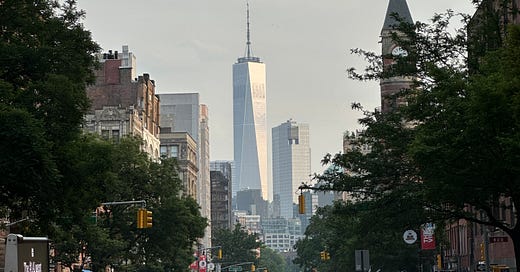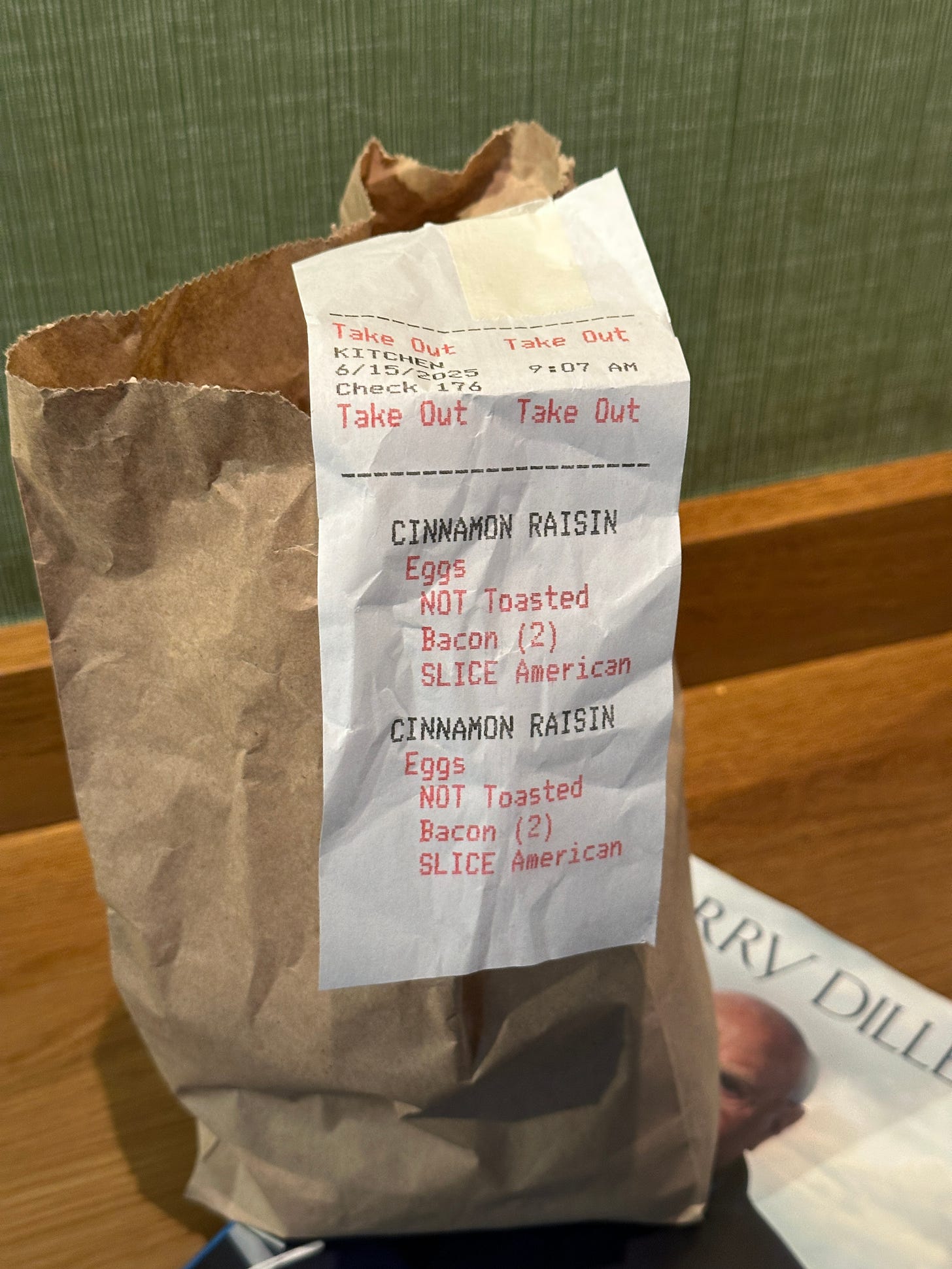New York City ghost-town vibes; CBS makes up a travel scare; the war for world's oldest restaurant
Plus, Airbnb still sounds delusional
Good morning from New York City! A smaller newsletter this week, as I’m working to put together my Amsterdam destination guide. (Here are the Paris, Montreal, Menorca, Newport, Antwerp, Tucson, and Rio de Janeiro.)
It was an interesting time to be back in the city, and not least because the weather swung wildly. I was curious to see how it felt walking around given the massive dropoff in tourists this year—17 percent less international visitors than last year, representing two million people!
As CNN notes, while international visits only make up 20 percent of visitors to NYC, they make up 50 percent of tourist spending. But it’s not just foreigners staying away. The city expects one million less domestic visitors in 2025 than last year, too. As opposed to those jetting off to Europe, domestic travelers are more price-sensitive. They’re turning more and more to road trips. And I’d argue post-COVID New York City is the most expensive major destination in the western world. From hotels to entertainment to drinks and dining out, you will not only spend gobs, but it will be utterly detached from the experience you’re getting.
It’s purely anecdotal, and likely shaped by me actively trying to notice if the city felt calmer, but I felt a genuine lack of overcrowdedness everywhere I went. Sure, there were tourists, but if you compared the areas I traipsed around—Soho, Chelsea, East Village, Fifth Avenue, and more—to what it’s like in any of the European cities right now you’d think it was a ghost town.
I don’t know what the solution is for New York City, if there even is a “solution” since the idea of there being a problem is predicated on the idea that tourism numbers growing is an inherently good thing. However, more than almost any other city, NYC’s energy is in part based on the idea that everybody wants to be here. So there’s something especially jarring about people actively choosing not to.
The city can’t control the political stuff that is keeping people away (a potent combo of horror stories at the border and foreigners using their wallets as a way of protesting current policies). And the cost stuff shows little sign of abating, though if you are Abundance-pilled, there are a myriad ways the city could become significantly more affordable and be less pressed to curb hotels and short-term rentals for one.
Anyways, I’m now headed to pick up my usual order for my train ride home—two bacon, egg, and cheese on cinnamon raisin bagels, untoasted. Enjoy the rest of the travel industry news below :)
DEPARTMENT OF GRIEVANCES
I loathe (maybe loathe isn’t even a strong enough word) stories that prey on people’s neuroses when traveling. All those stories about how many germs are on your plane tray or in the hotel bathtub are so aggravating because none of them ever say how many people, if any, actually get sick! It’s terrible journalism if one can even call it that and is pure exploitation. So it made me livid when I saw CBS ran a feature called “How to avoid getting hacked through public airport charging stations, wifi.” In it, the CBS correspondent Yasmin Khorram scares viewers into thinking that people all across the country are having their information stolen right off their phones at airports by plugging their devices in to charge. It’s something that’s been dubbed “juice-jacking.” I watched the entire piece, and nowhere in the piece does the reporter give us a single actual victim, nor does the reporter bother to even say how many cases we think happen a year. Just pure fear-mongering. Curious, I go to read more as I’ve never even heard of “juice-jacking.” Well, the FCC a year and a half ago said while it “has been demonstrated to be technically possible as a proof of concept, the FCC is not aware of any confirmed instances of it occurring.”
It looks like the CBS story might stem from a Facebook post earlier this spring by the TSA that does not say anything about any known victims. And yet CBS says in the video: “victims frequently will not know about the compromise for a while.” !!!
If the intended effect of spraying random people seated at lunch with water guns is that fewer tourists come to Barcelona, consider it a winner because it certainly makes me want to go elsewhere.
Part of the boom in American travel to Europe has been a concurrent expansion in routes crossing the Atlantic, particularly to American cities that have not had multiple direct flights to multiple European cities. This route saturation is in large part why PLAY Airlines is scrapping all its U.S. flights. The budget Icelandic operator that allowed you to get to Europe on the cheap by connecting in Reykjavík just couldn’t compete with all the mainline carriers. What is interesting to me as a somewhat casual consumer of aviation industry news, is that at a time where airlines are cutting routes and struggling with plane deliveries and maintenance, they’ve been able to expand the transatlantic beat. That’s because they’ve been able to take planes that had been going to Asia and swap them. Europe-Asia connections have largely dropped because of Russia airspace issues making the flights very expensive or difficult to operate and slowing demand out of China. Interesting stuff!
When I first pilloried Airbnb’s new Experiences and Services options, I noted that one of the challenges the company faces is that people don’t like tech companies all that much any more because of bad behavior and heavy-handedness in the past. Well now it turns out that hasn’t much changed. Beloved tour operators ToursByLocals and Withlocals have both separately accused Airbnb of shady behavior. Skift reports (and confirms) that “people with Airbnb email addresses created accounts on their sites, and then violated their terms and conditions by messaging tour guides to recruit them to Airbnb Experiences.” I mean, come on. I get that it’s business and cutthroat, but people already don’t like you and you’re venturing into a part of the travel business that is entirely predicated on your reputation!
At the same time, the big hotel groups are shrugging off Airbnb’s push, largely for reasons I wrote about: How difficult it is to scale and control this part of the travel industry. And Airbnb’s Chief Business Officer Dave Stephenson spoke recently at the Skift Asia Forum and talked all about the new push. Some of it made me want to pull out my hair. I don’t know anybody who has soured on Airbnb because they don’t have tours or a hair stylist. I do know people who have soured because they don’t like Airbnb’s effect on communities, on the insane and hidden fees, on the user experience (you still can’t search by rating), the lack of flexibility, and nutty host requests. So you can imagine my eyes bulging when I read Stephenson’s line that with Experiences and Services, “We’re eliminating reasons why people wouldn’t want to stay in an Airbnb.”
(I gave props last week to Skift for being the only news organization that isn’t just credulously reprinting Airbnb’s claims about what it’s going to do. While that remains the case on the news side, I want to give a nod to Afar for pubbing a story this week being skeptical of this whole thing.)
Finally, a major news outlet is taking sports tourism seriously! (In this case, the Financial Times.) In my time at Travel + Leisure, I was always perplexed by the lack of desire to engage even slightly with sports tourism. But that isn’t unique to T+L. Given just how massive sports tourism, every major travel outlet should be covering it. I’m trying to do better on my end this fall by planning a trip to go to my first big D1 college football game.
This FT piece headlined “How not to summer in Marseille” was not actually very specific or helpful…
AIA’s award winners this year include this very on-the-nose design for the Shanghai Astronomy Museum. (Almost as on the nose as Baku’s Carpet Museum.)
TRAVEL INDUSTRY NEWS
Eurostar is planning to launch routes to Germany and Switzerland from London
Two Madrid restaurants are fighting over who is the oldest in the world
New York Times restaurants critics no longer anonymous
9-year-old girl nearly has her hand bitten off by shark while snorkeling off Florida Gulf Coast
Residents of 36 more countries may be banned from U.S.
National Parks coverage is driving more than 10 percent of SFGate’s readership
Man booked over 120 free flights by pretending to be flight attendant








Thanks for sharing this with your readers, but where’s the bit about the world’s oldest restaurant?
You should interview Ron Klain C’81 about your Airbnb feedback.